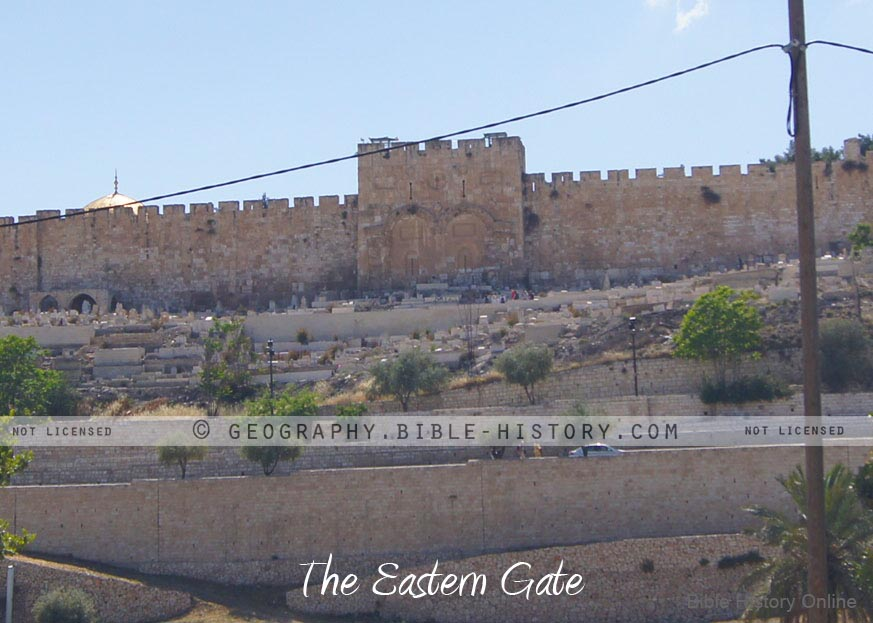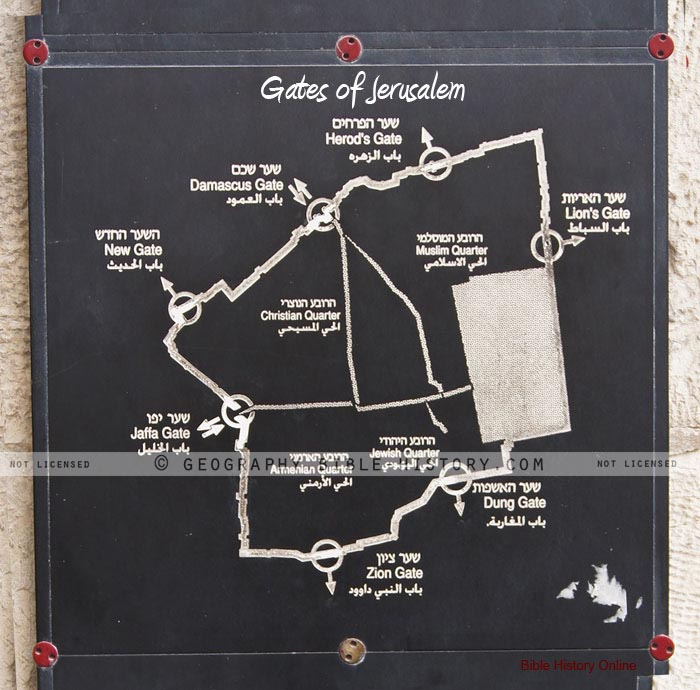The Golden Gate - First Century Jerusalem
![]()
 Golden
Gate or Susa Gate (Eastern Gate).
Golden
Gate or Susa Gate (Eastern Gate).
During the time of the First Temple the Eastern Gate (also called Shushan or HaKohan gate) was the main entrance into the Temple area. It was also the gate that Jesus entered on a humble donkey in His triumphal entry. If one were to stand on the Mount of Olives he could look over this Eastern Gate into the huge area presently north of the Dome of the Rock and see all the gates (at different levels) in a perfect line: the East (Shushan) Gate --Outer Court Gate --Inner Court Gate --Temple Entrance. The Talmud makes an interesting observation:
"All the walls which were there were high, except the wall in the east, so that the priest who burned the heifer, standing on the top of the Mount of Olives, and directing himself to look, saw through the gateway of the sanctuary, at the time when he sprinkled the blood." [Mishnah, Middot 2:4].
The Golden Gate (Eastern Gate) in the eastern wall of Jerusalem gave access to the courtyards of the Temple from the Kidron valley.

The Eastern Gate in Jerusalem
During the time of the First Temple the Eastern Gate (also called Shushan or HaKohan gate) was the main entrance into the Temple area. It was also the gate that Jesus entered on a humble donkey in His triumphal entry. If one were to stand on the Mount of Olives he could look over this Eastern Gate into the huge area presently north of the Dome of the Rock and see all the gates (at different levels) in a perfect line: the East (Shushan) Gate --Outer Court Gate --Inner Court Gate --Temple Entrance. The Talmud makes an interesting observation:
"All the walls which were there were high, except the wall in the east, so that the priest who burned the heifer, standing on the top of the Mount of Olives, and directing himself to look, saw through the gateway of the sanctuary, at the time when he sprinkled the blood." [Mishnah, Middot 2:4].The Golden Gate (Eastern Gate) in the eastern wall of Jerusalem gave access to the courtyards of the Temple from the Kidron valley.
TraditionAccording to Jewish tradition the Messiah (Mashiach) will enter Jerusalem from the east. The gate has a special holiness; legend has it that the Shechinah (Divine Presence) used to appear through this gate and will appear again, and that in the meantime it must be left untouched.
The Arabs (Moslems) call this gate The Mercy Gate (Bab el Rahmeh) and according to the Koran, the just will pass through this gate on the Day of Judgment.The Sealed Gate
It is interesting that this gate is the only one of the eight gates in Jerusalem that is sealed. The Arabs believe that since the Jews expect that Messiah would come through this gate (Sha'ar harachamim) they would try to prevent any possibility of His return.The East gate was walled up by it's Muslim conquerors (the Ottoman Turks) with great stones in 1530 A.D. and a cemetery was planted in front of it thinking that the Jewish Messiah could not set foot in a cemetery and therefore would not be able to come. Many believe this was done to prevent the entrance of the Jewish Messiah through that gate as was foretold by known Old Testament prophecies. However, Ezekiel prophesied the shutting of this gate itself around 600 B.C. -- that it would be shut "because the LORD (Jehovah or Yahweh), the God of Israel, hath entered in by it, therefore it shall be shut."
The East Gate and the Return of the MessiahNeh. 3:29 "...the gate that looketh toward the east: And the glory of the Lord came into the house by the way of the gate whose prospect is toward the east."
Ezekiel 44:1-3 Then he brought me back to the outer gate of the sanctuary, which faces east; and it was shut. And he said to me, "This gate shall remain shut; it shall not be opened, and no one shall enter by it; for the LORD, the God of Israel, has entered by it; therefore it shall remain shut. Only the prince may sit in it to eat bread before the LORD; he shall enter by way of the vestibule of the gate, and shall go out by the same way."Jesus entered Jerusalem through the East gate around 30 A.D. (long before it was blocked by the Ottomans) as he came down from the Mount of Olives and entered the temple according to our understanding of Luke 19:28-48. He would have entered through the original gate in the wall which was destroyed with the city by the Romans in 70 A.D. Ezekiel says concerning this closed gate that the "Prince" (which the Messiah is often called throughout the Old Testament and Jesus is called in the New Testament) shall enter it again. Jesus, having entered the city, said that he would not be seen again until Jerusalem acknowledges him (Matthew 23:37-39).
Today the Temple Mount is under Muslim control, and it is just over the golden (eastern) gate and has been guarded very closely even today.The Eastern gate is presently considered by the Arabs to be their exclusive property. It is sealed up and blocked off. However one day, the Messiah will land on the Mount of Olives, with all His saints, and walk down to and right through the Eastern Gate and into the Temple area.
The Seven Gates of Jerusalem

Photo taken from the Ramparts Walk from the Jaffa Gate to the Lion's Gate in
Jerusalem
Many gates were located in first century Jerusalem and here are a few: The Dung Gate was part of the southern wall near the city of David leading to the Hinnom Valley. There was also the Tekoa Gate which led a traveler in the direction of Tekoa. The Essene Gate was located in the southwestern corner and it led into the area of the Essene Quarter. Of the Joppa Gate was definitely the busiest gate and it led a traveler toward Joppa. The three mighty towers stood near the Joppa Gate. The Damascus Gate or more properly the Shechem Gate was very beautiful located along the second wall. The Eastern Gate (Susa Gate) was located on the eastern wall leading into the Kidron Valley and the Mount of Olives.
![]()
Read The Bible
- 1599 Geneva Bible (GNV)
- 21st Century King James Version (KJ21)
- American Standard Version (ASV)
- Amplified Bible (AMP)
- Amplified Bible, Classic Edition (AMPC)
- Authorized (King James) Version (AKJV)
- BRG Bible (BRG)
- Christian Standard Bible (CSB)
- Common English Bible (CEB)
- Complete Jewish Bible (CJB)
- Contemporary English Version (CEV)
- Darby Translation (DARBY)
- Disciples’ Literal New Testament (DLNT)
- Douay-Rheims 1899 American Edition (DRA)
- Easy-to-Read Version (ERV)
- English Standard Version (ESV)
- English Standard Version Anglicised (ESVUK)
- Evangelical Heritage Version (EHV)
- Expanded Bible (EXB)
- GOD’S WORD Translation (GW)
- Good News Translation (GNT)
- Holman Christian Standard Bible (HCSB)
- International Children’s Bible (ICB)
- International Standard Version (ISV)
- J.B. Phillips New Testament (PHILLIPS)
- Jubilee Bible 2000 (JUB)
- King James Version (KJV)
- Lexham English Bible (LEB)
- Living Bible (TLB)
- Modern English Version (MEV)
- Mounce Reverse Interlinear New Testament (MOUNCE)
- Names of God Bible (NOG)
- New American Bible (Revised Edition) (NABRE)
- New American Standard Bible (NASB)
- New American Standard Bible 1995 (NASB1995)
- New Catholic Bible (NCB)
- New Century Version (NCV)
- New English Translation (NET)
- New International Reader's Version (NIRV)
- New International Version - UK (NIVUK)
- New International Version (NIV)
- New King James Version (NKJV)
- New Life Version (NLV)
- New Living Translation (NLT)
- New Matthew Bible (NMB)
- New Revised Standard Version (NRSV)
- New Revised Standard Version Catholic Edition (NRSVCE)
- New Revised Standard Version, Anglicised (NRSVA)
- New Revised Standard Version, Anglicised Catholic Edition (NRSVACE)
- New Testament for Everyone (NTE)
- Orthodox Jewish Bible (OJB)
- Revised Geneva Translation (RGT)
- Revised Standard Version (RSV)
- Revised Standard Version Catholic Edition (RSVCE)
- The Message (MSG)
- The Voice (VOICE)
- Tree of Life Version (TLV)
- World English Bible (WEB)
- Worldwide English (New Testament) (WE)
- Wycliffe Bible (WYC)
- Young's Literal Translation (YLT)
Table of Contents
Main Menu
- Ancient Assyrian Social Structure
- Ancient Babylonia
- Ancient Canaan During the Time of Joshua
- Ancient History Timeline
- Ancient Oil Lamps
- Antonia Fortress
- Archaeology of Ancient Assyria
- Assyria and Bible Prophecy
- Augustus Caesar
- Background Bible Study
- Bible
- Biblical Geography
- Fallen Empires - Archaeological Discoveries and the Bible
- First Century Jerusalem
- Glossary of Latin Words
- Herod Agrippa I
- Herod Antipas
- Herod the Great
- Herod's Temple
- High Priest's in New Testament Times
- Jewish Literature in New Testament Times
- Library collection
- Map of David's Kingdom
- Map of the Divided Kingdom - Israel and Judah
- Map of the Ministry of Jesus
- Matthew Henry Bible Commentary
- Messianic Prophecy
- Nero Caesar Emperor
- Online Bible Maps
- Paul's First Missionary Journey
- Paul's Second Missionary Journey
- Paul's Third Missionary Journey
- Pontius Pilate
- Questions About the Ancient World
- Tabernacle of Ancient Israel
- Tax Collectors in New Testament Times
- The Babylonian Captivity
- The Black Obelisk of Shalmaneser
- The Books of the New Testament
- The Court of the Gentiles
- The Court of the Women in the Temple
- The Destruction of Israel
- The Fall of Judah with Map
- The History Of Rome
- The Incredible Bible
- The Jewish Calendar in Ancient Hebrew History
- The Life of Jesus in Chronological Order
- The Life of Jesus in Harmony
- The Names of God
- The New Testament
- The Old Testament
- The Passion of the Christ
- The Pharisees
- The Sacred Year of Israel in New Testament Times
- The Samaritans
- The Scribes
Ancient Questions
- Why Do the Huldah Gates Appear Different in Ancient Replicas and Modern Photos?
- What Is the Origin of the Japanese and Chinese Peoples? A Biblical Perspective
- How did the ancient Greeks and Romans practice medicine and treat illnesses?
- What were the major contributions of ancient Babylon to mathematics and astronomy?
- How did the ancient Persians create and administer their vast empire?
- What were the cultural and artistic achievements of ancient India, particularly during the Gupta Empire?
- How did ancient civilizations like the Incas and Aztecs build their remarkable cities and structures?
- What were the major trade routes and trading practices of the ancient world?
- What was the role of slavery in ancient societies like Rome and Greece?
- How did the ancient Mayans develop their sophisticated calendar system?
Bible Study Questions
- Why Do Christians Celebrate Christmas?
- How Many Chapters Are There in the Bible?
- The Five Key Visions in the New Testament
- The 400-Year Prophecy: Unpacking Genesis 15 and the Journey of a People
- The Authorized (King James) Version (AKJV): Historical Significance, Translation Methodology, and Lasting Impact
- Exploring the English Standard Version (ESV): Its Aspects, Comparisons, Impact on Biblical Studies, and Church Use
- A Detailed Historical Analysis of Language Updates in the KJ21: Comparison with Other Versions
- A Detailed Historical Analysis of the American Standard Version (ASV): Comparison to the King James Version, Influence on Later Translations, and Evaluation of Strengths and Weaknesses
- A Detailed Historical Analysis of Amplifications in the Amplified Bible (AMP) and Its Comparison to Other Bible Translations
- Detailed Historical Analysis of the Amplified Bible Classic Edition (AMPC): Examples of Amplifications and Comparative Analysis with Other Bible Translations
About
Welcome to Free Bible: Unearthing the Past, Illuminating the Present! Step into a world where ancient history and biblical narratives intertwine, inviting you to explore the rich tapestry of human civilization.
Discover the captivating stories of forgotten empires, delve into the customs and cultures of our ancestors, and witness the remarkable findings unearthed by dedicated archaeologists.
Immerse yourself in a treasure trove of knowledge, where the past comes alive and illuminates our understanding of the present.
Join us on this extraordinary journey through time, where curiosity is rewarded and ancient mysteries await your exploration.
Recent posts
-

Best gemstones for stud earrings for 15 years girl
Selecting the perfect pair of stud earrings for a 15-year-old girl is an exciting yet thoughtful process. Stud earrings are a timeless accessory, offe... -

Prayers for Prophets: A Reflection on Reverence and Intercession
Prophets hold a revered status across many of the world’s major religions. As individuals chosen to convey divine messages, they are often remembere... -

How Machine Learning is Reducing Risk in Automated Trading
In today’s fast-paced monetary markets, automated buying and selling has come to be a cornerstone of current making an investment. Algorithms now ex... -

Timur Turlov: Driving Global Investment Innovation Through Freedom Holding Corp.
Timur Turlov leads Freedom Holding Corp. (NASDAQ: FRHC) as its CEO where he connects technology with finance and global markets. Turlov established Fr... -

AI in the Legal Industry: Can Algorithms Replace Lawyers?
The legal career is historically considered as a discipline rooted in human judgment, nuance, and vital questioning. But in recent years, Artificial I...